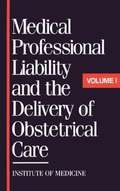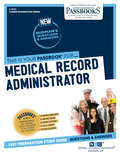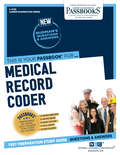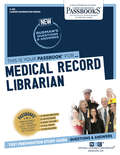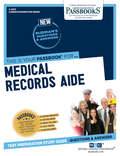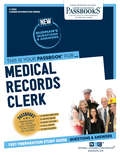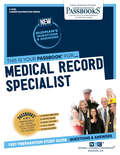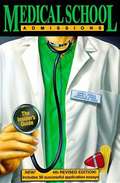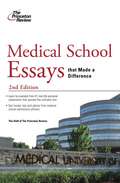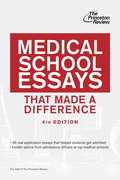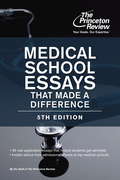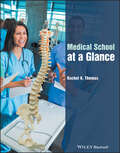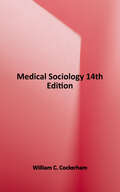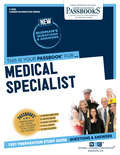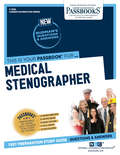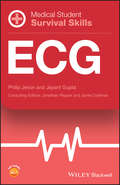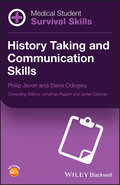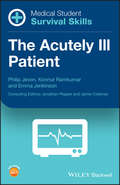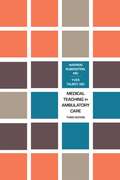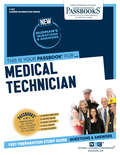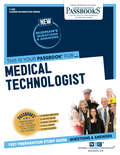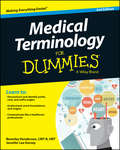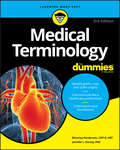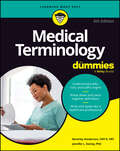- Table View
- List View
Medical Professional Liability and the Delivery of Obstetrical Care: Volume I
by Committee To Study Medical Professional Liability The Delivery Of Obstetrical CareThis is the first part of an in-depth study focusing on medical liability and its effect on access to and delivery of obstetrical care.The book addresses such questions as:Do liability concerns impede the use of new technologies?Have liability issues affected the physician-patient relationship? Are community health and maternity centers being harmed? What specific remedies are being considered and what are their prospects for success?
Medical Psychosocial And Vocational Aspects Of Disability
by Elliott FitzpatrickThe text contains 33 chapters on selected topics in medicine and rehabilitation. The chapters fall within the following major categories: Rehabilitation Medicine, Common Medical Conditions, Sensory Organ Conditions, Brain and Spinal Cord Conditions, Neuromuscular and Joint Conditions, Psychosocial Conditions, Developmental Conditions, Assistive Technology and Reconstructive Repair, and Genetics. The text also contains an Appendix of Medical Terminology and a detailed Index. The text provides a discussion at the end of each chapter, along with a brief case summary to illustrate how the information is relevant to the person/client. The intent of the authors is to present medical and psychosocial information and make the information relevant to the rehabilitation process for person with disabilities. Although the text is used in a variety of settings, the resource was initially developed and revised every five years specifically for the student in the rehabilitation counseling training programs at major universities around the country. The lead author, Dr. Marty Brodwin, was a long time rehabilitation educator (recently retired) at California State University at Los Angeles.
Medical Record Administrator: Passbooks Study Guide (Career Examination Series #Ats-84)
by National Learning CorporationThe Medical Record Administrator Passbook® prepares you for your test by allowing you to take practice exams in the subjects you need to study. It provides hundreds of questions and answers in the areas that will likely be covered on your upcoming exam, including but not limited to: coding/decoding information; medical terminology; name and number checking; office record keeping; understanding and interpreting written material; supervision; and more.
Medical Record Coder: Passbooks Study Guide (Career Examination Series)
by National Learning CorporationThe Medical Record Coder Passbook® prepares you for your test by allowing you to take practice exams in the subjects you need to study. It provides hundreds of questions and answers in the areas that will likely be covered on your upcoming exam, including but not limited to: coding/decoding information; medical terminology; name and number checking; office record keeping; understanding and interpreting written material; supervision; and more.
Medical Record Librarian: Passbooks Study Guide (Career Examination Series #C-1013)
by National Learning CorporationThe Medical Record Librarian Passbook® prepares you for your test by allowing you to take practice exams in the subjects you need to study. It provides hundreds of questions and answers in the areas that will likely be covered on your upcoming exam, including but not limited to; Supervision; Training of medical department personnel; Instruction of personnel; Analysis of clinical records; and more.
Medical Records Aide: Passbooks Study Guide (Career Examination Series #Vol. 4373)
by National Learning CorporationThe Medical Records Aide Passbook® prepares you for your test by allowing you to take practice exams in the subjects you need to study. It provides hundreds of questions and answers in the areas that will likely be covered on your upcoming exam, including but not limited to: clerical operations; name and number checking; office record keeping; and other related areas.
Medical Records Clerk: Passbooks Study Guide (Career Examination Series)
by National Learning CorporationThe Medical Records Clerk Passbook® prepares you for your test by allowing you to take practice exams in the subjects you need to study. It provides hundreds of questions and answers in the areas that will likely be covered on your upcoming exam, including but not limited to; Record keeping; Following directions in use of number-letter codes; Understanding and interpreting written material; Arithmetic reasoning; Medical terminology; and more.
Medical Records Specialist: Passbooks Study Guide (Career Examination Series)
by National Learning CorporationThe Medical Records Specialist Passbook® prepares you for your test by allowing you to take practice exams in the subjects you need to study. It provides hundreds of questions and answers in the areas that will likely be covered on your upcoming exam, including but not limited to: abstracting information from medical records; distinguishing between primary and differential diagnoses; assigning ICD9CM and CPT4 codes; medical terminology; completing forms; and more.
Medical School Admissions: The Insider's Guide (4th Revised Edition)
by John A. Zebala Daniel B. Jones Stephanie B. JonesThis book offers practical advice on college studies, the MCAT, extracurricular activities, and interview techniques. It also has 50 successful application essays that give examples and inspiration to students.
Medical School Essays That Made a Difference
by The Princeton ReviewMany pre-med students have great MCAT scores and excellent grades--the best way to stand out in a crowd of medical school applicants is to write an exceptional essay!
Medical School Essays That Made a Difference, 4th Edition
by Princeton ReviewStand out from the med school application crowd with an essay that makes a statement. Gaining admission to a top medical school requires more than "just" a stellar MCAT score and an excellent GPA. You'll also need to nail your personal statement. In this book, you'll find the help you need to do just that: * 45 real essays written by 39 unique future doctors, along with each applicant's test scores, GPA, and admissions profile * An overview of med school admissions and financial aid, including a breakdown of the "anatomy" of the application * Interviews with admissions officers who have read thousands of application essaysThis fourth edition of Medical School Essays that Made a Difference includes application essays from students who enrolled at the following schools:Baylor College of MedicineCase Western Reserve University, Cleveland Clinic Lerner College of MedicineCornell University, Weill Medical CollegeEdward Via Virginia College of Osteopathic MedicineGeorgetown University, School of MedicineJohns Hopkins University, School of MedicineMedical College of GeorgiaMeharry Medical College, School of MedicineMichigan State University, College of Osteopathic MedicineNew York University, NYU School of MedicineRush University, Rush Medical CollegeTemple University, School of MedicineThomas Jefferson University, Jefferson Medical CollegeTulane University, School of MedicineUniversity of California--San Francisco, School of MedicineUniversity of Minnesota--Twin Cities, Medical SchoolUniversity of North Dakota, School of Medicine and Health SciencesUniversity of South Alabama, College of MedicineUniversity of South Florida, College of MedicineUniversity of Southern California, Keck School of MedicineUniversity of Virginia, School of MedicineUniversity of Wisconsin--Madison, School of MedicineVirginia College of Osteopathic MedicineWashington University in St. Louis, School of MedicineYale University, School of MedicineYeshiva University, Albert Einstein College of Medicine
Medical School Essays That Made a Difference, 5th Edition
by Princeton ReviewThe inside word on medical school admissions.Gaining admission to a top medical school requires more than "just" a stellar MCAT score and an excellent GPA. You'll also need to nail your personal statement. In this book, you'll find the help you need to do just that: * 45 real essays from future doctors, along with each applicant's MCAT scores, GPA, and admissions profile * An overview of med school admissions and financial aid, including a breakdown of the "anatomy" of the application * Interviews with admissions officers who have read thousands of application essaysThis fifth edition of Medical School Essays That Made a Difference includes application essays from students who enrolled at the following schools:Cornell University, Joan and Sanford I. Weill Medical CollegeGeorgetown University, School of MedicineJohns Hopkins University, School of MedicineNew York University, NYU School of MedicineTemple University, School of MedicineTulane University, School of MedicineUniversity of Virginia, School of MedicineUniversity of Wisconsin--Madison, School of Medicine and Public HealthYale University, School of MedicineFrom the Trade Paperback edition.
Medical School at a Glance
by Rachel K. ThomasStarting Medical School can be incredibly daunting, and the transition to being a medical student can be enormously challenging. Medical School at a Glance is an accessible guide to help give you confidence and to gain a running start to your medical school training. Covering core areas such as medical training, developing effective learning strategies, understanding common principles, learning how to behave in the clinical setting and how to interact with patients and peers, this book will help to demystify the process and prepare you as you embark on your medical career. Providing an insider's view of useful information to build a solid basic foundation for your learning, Medical School at a Glance is essential for those considering studying medicine or are in their first years of study.
Medical Sociology, Fourteenth Edition
by William C. CockerhamThe most thorough major academic textbook available, this classic text presents the most important research studies in the field. The author also integrates engaging first-person accounts from patients, physicians, and other healthcare providers throughout the text. A much greater number of first-person accounts and updated examples are added to the new fourteenth edition. Other updates include: - Coverage of Zika, Ebola, MERS, and updates on other pandemics - Expanded discussion of obesity as a disease - Coverage of the widening gap in life expectancy between the rich and the poor - New information on the decline of life expectancy among American white women, especially those who live in rural counties - New material on biomarkers, gene-environment interaction, and stress - Analysis of the role of the hidden curriculum in medical schools - Exiting the Affordable Care Act
Medical Specialist: Passbooks Study Guide (Career Examination Series)
by National Learning CorporationThe Medical Specialist Passbook® prepares you for your test by allowing you to take practice exams in the subjects you need to study. It provides hundreds of questions and answers in the areas that will likely be covered on your upcoming exam, including but not limited to; Medicine; Clinical diagnosis of medical problems; and more.
Medical Stenographer: Passbooks Study Guide (Career Examination Series #C-1368)
by National Learning CorporationThe Medical Stenographer Passbook® prepares you for your test by allowing you to take practice exams in the subjects you need to study. It provides hundreds of questions and answers in the areas that will likely be covered on your upcoming exam.
Medical Student Survival Skills: History Taking and Communication Skills (Medical Student Survival Skills)
by Philip Jevon Steve OdogwuMedical students encounter many challenges on their path to success, from managing their time, applying theory to practice, and passing exams. The Medical Student Survival Skills series helps medical students navigate core subjects of the curriculum, providing accessible, short reference guides for OSCE preparation and hospital placements. These guides are the perfect tool for achieving clinical success. Medical Student Survival Skills: History Taking and Communication Skills is a concise and compact guide to obtaining and recording medical histories and achieving positive patient interactions. The first section explores taking history—from initial introduction to identifying symptoms—and includes abdominal and chest pain, dizziness and vertigo, shortness of breath, sexual history, confusion and loss of memory. Essential patient communication skills and strategies for various situations are described in the second section, including angry patients, instances of drug and alcohol abuse, diabetes counselling and breaking bad news.
Medical Student Survival Skills: The Acutely Ill Patient (Medical Student Survival Skills)
by Philip Jevon Konnur Ramkumar Emma JenkinsonMedical students encounter many challenges on their path to success, from managing their time, applying theory to practice, and passing exams. The Medical Student Survival Skills series helps medical students navigate core subjects of the curriculum, providing accessible short reference guides for OSCE preparation and hospital placements. These guides are the perfect tool for achieving clinical success.
Medical Teaching in Ambulatory Care, Third Edition
by Warren Rubenstein Yves TalbotA practical, hands-on resource for physicians in all specialties, Medical Teaching in Ambulatory Care is a guide on training medical students and residents in settings such as private practices and hospital clinics. Concise, engaging, and easy to follow, it is an ideal handbook for the busy practitioner looking to upgrade his or her teaching abilities.The authors cover basic education theory, individual teaching skills, strategies for evaluating trainees, and tips on working with challenging learners. Readers can follow along with the storyline of a fictional Dr. Smith, through whom the book provides practical examples that complement each theory, skill, and strategy presented.This new edition has been updated with key medical education theories that are now core to current approaches, expanded details on one-to-one teaching, and information on structured formats to use when reviewing patient encounters with learners. The authors also examine the impact of digital technology on medical education in office-based settings and provide tips on working with the new generation of learners who enjoy - and expect - instant access to information of all kinds.
Medical Technician: Passbooks Study Guide (Career Examination Series #C-3353)
by National Learning CorporationThe Medical Technician Passbook® prepares you for your test by allowing you to take practice exams in the subjects you need to study. It provides hundreds of questions and answers in the areas that will likely be covered on your upcoming exam.
Medical Technologist: Passbooks Study Guide (Career Examination Series #C-493)
by National Learning CorporationThe Medical Technologist Passbook® prepares you for your test by allowing you to take practice exams in the subjects you need to study. It provides hundreds of questions and answers in the areas that will likely be covered on your upcoming exam.
Medical Terminology For Dummies
by Jennifer Lee Dorsey Beverley HendersonConfused by medical terms? Don't know a carcinoma from a hematoma? Medical Terminology For Dummies gets you up to speed quickly on medical terminology fundamentals and helps you master medical definitions, pronunciations, and applications across all health care fields. Once you understand medical prefixes, suffixes, and root words, you'll approach even unfamiliar medical terms with confidence.This plain-English guide to language that can be just plain confusing clears up the meanings of the Greek and Latin sources of medical terms. You'll get a handle on how these mouthfuls are constructed, and discover how to decipher any medical term, no matter how complex or unusual. You'll also get plenty of help in pronouncing and remembering medical words, and you'll find out how and why the terminology changes from hospital to laboratory to pharmacy. You'll discover how to:Understand word foundations and originsGrasp the essential meanings of unfamiliar termsDefine common prefixes and suffixesIdentify and pronounce medical termsDeconstruct words to grasp definitionsUse plurals and multiples with easeDescribe medical conditions accuratelyBone up on terms that describe the anatomyUse mnemonic devices to remember medical termsKnow when words refer to diseases, injuries, treatments, and moreUse medical terminology in the real worldComplete with a list of essential references on medical terminology as well as helpful word-building activities Medical Terminology For Dummies puts you in the know in no time.
Medical Terminology For Dummies
by Beverley Henderson Jennifer L. DorseyTake the intimidation out of medical terminology Every job in the medical field needs some background in medical terminology. From the check-in desk to the doctor to the pharmaceutical sales rep, and everyone around and in between, healthcare professionals and those in adjacent fields use a common and consistent vocabulary to improve quality, safety, and efficiency. Medical Terminology For Dummies is a powerful resource for current and prospective healthcare professionals. It provides different ways to memorize the words and their meanings, including ideas for study materials, flash cards, quizzes, mind maps, and games. Plus, you’ll discover how to identify, pronounce, define, and apply words in proper context. Grasp the standardized language of medicine Find the easiest way to remember tongue-twisting terms Benefit from lots of definitions and examples Understand, retain, and put this knowledge to use If you’re one of the millions of professionals hoping to succeed in this booming field, this book gets you talking the talk so you can walk the walk!
Medical Terminology For Dummies
by Beverley Henderson Jennifer L. DorseyBecome fluent in the standardized language of all medical fields Medical Terminology For Dummies is a resource for current and prospective healthcare professionals who need to understand medical terms, from common to complex. This book clearly explains how to quickly identify, pronounce, define, and apply medical terms in a healthcare setting. You'll also find ideas for creating mind maps and games to help you study and retain the language of medicine. Pair those study tools with an understanding of the history and origins of key prefixes, suffixes, and roots, and you'll be confident in no time. This updated guide covers the 2022 updates to ICD-10 codes, and it includes added terminology related to public health and infectious diseases. Whatever healthcare field you're in, this book will serve as your glossary of terms and a gateway to future learning opportunities. Understand prefixes, roots, and suffixes, so you can confidently work out the meanings of complex terms Practice defining medical terms and get help memorizing key vocabulary elements Enhance your professional expertise in any healthcare setting Improve the safety and accuracy of medical communications All medical and healthcare related careers require some knowledge of medical terminology. Start off on the right foot—or brush up what you already know—with Medical Terminology For Dummies.
